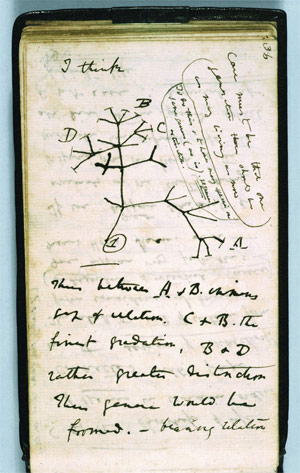 |
| A reproduction of the first-known sketch by Charles Darwin of an evolutionary tree describing the relationships among groups of organisms. |
Were Charles Darwin alive today, he’d be celebrating not only his 200th birthday this year but the 150th anniversary of the publication of his groundbreaking On the Origin of Species.
But for a man synonymous with his theory—so much so that Darwinism and evolution are often used interchangeably—there’s a lot that he wouldn’t recognize about it today.
“We’re beginning to realize that the process of evolution is much more complicated than Darwin made it out to be,” explains Ford Doolittle, professor in Biochemistry and Molecular Biology. “For example, we’ve accepted for a few decades now that natural selection is not the only method of evolution. Instead, we know that evolution is like a toolkit of explanatory techniques.”
Next week, Dr. Doolittle and his colleagues (Gordon McOuat at King’s, Richmond Campbell and Jerry Barkow at Dal, and Lisa Gannett at SMU) are bringing dozens of the world’s foremost scholars on both Darwin and evolution to campus for a series of professional workshops and public lectures titled “The Idea of Evolution."
|
The public lecture series features three leading researchers in each of those fields. It kicks off on Wednesday, Oct. 14 with Ian Hacking from the University of Toronto, one of Canada’s most renowned philosophers and the 2009 winner of the Holberg International Memorial Prize. His talk, titled “The Tree of Knowledge,” will explore the how humanity has used trees as a tool to try and understand the world around us, but one with significant limitations.
Dr. Hacking came up with the topic after being challenged by one of his own students. “A student in a seminar of mine kept going, 'Professor Hacking, you’re wrong' for 13 weeks straight,” he says on the phone from Toronto. “I had a simplistic view of the logical nature of a tree as a very simple graph structure. I came to realize that as a matter of history, she was right. It was the difference between the biologist’s view of the tree and my view with my background in logic. I wanted to try and explore that.”
“We find it very convenient to arrange information on trees and that often actually puts up barriers to understanding,” he continues, mentioning Dr. Doolittle’s work complicating Darwin’s “Tree of Life” model. “I’m hoping that the audience will better appreciate the way in which the drawing of tree diagrams has been so important in organizing thought over the past 800 years. Why is it so pervasive in the medieval, renaissance and the modern world?”
The series continues on Thursday evening with Janet Browne, Harvard University historian, who will be exploring Darwin’s personal legacy throughout the past 200 years. It concludes on Friday with Marc Feldmen, Stanford University biologist, who will look at how genetics can help us track the migrations and evolution of the human race from the origins and spread out of Africa through to today.
The week also includes a free public concert at the Maritime Museum of the Atlantic on Saturday, October 17 at 8 p.m. Peter Godfrey-Smith and other musicians will perform the Atlantic Canadian premiere of The Origin Cycle, six new compositions for chamber orchestra and soprano based on passages from Darwin’s Origin of Species.
The events are sponsored by the Canadian Institute for Advanced Research, SSHRC’s ‘Situating Science’ Knowledge Cluster and Dalhousie University.
Comments
comments powered by Disqus
